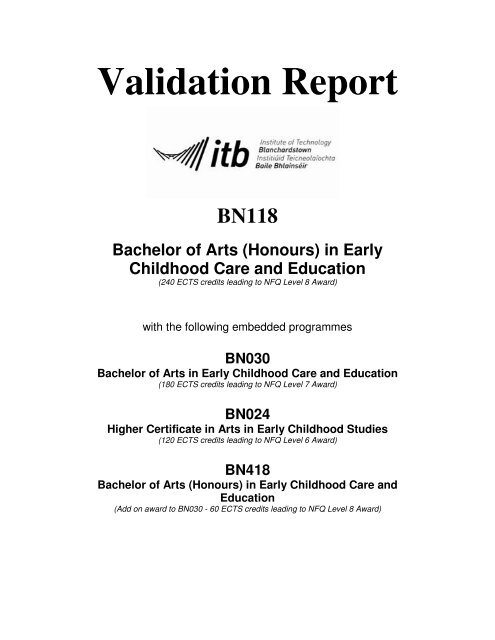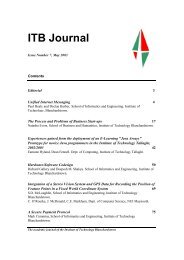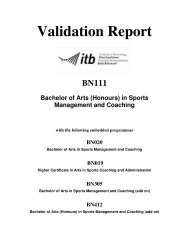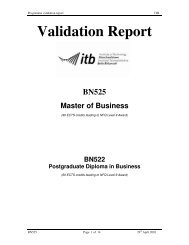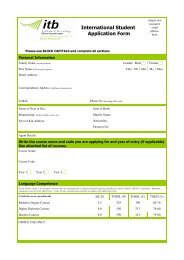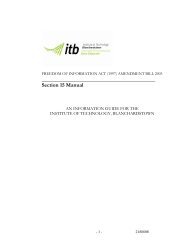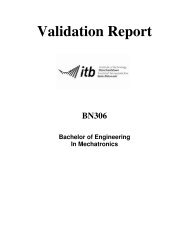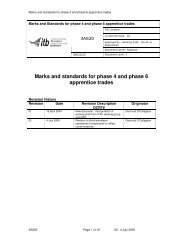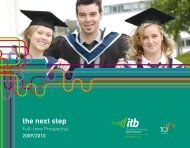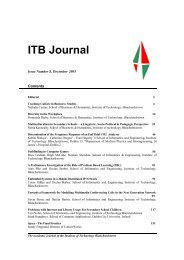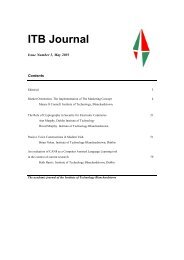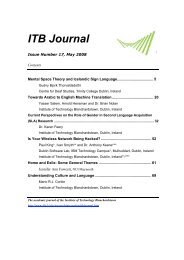Validation Report BN118 - Early Childhood Care and Education
Validation Report BN118 - Early Childhood Care and Education
Validation Report BN118 - Early Childhood Care and Education
Create successful ePaper yourself
Turn your PDF publications into a flip-book with our unique Google optimized e-Paper software.
<strong>Validation</strong> <strong>Report</strong><br />
<strong>BN118</strong><br />
Bachelor of Arts (Honours) in <strong>Early</strong><br />
<strong>Childhood</strong> <strong>Care</strong> <strong>and</strong> <strong>Education</strong><br />
(240 ECTS credits leading to NFQ Level 8 Award)<br />
with the following embedded programmes<br />
BN030<br />
Bachelor of Arts in <strong>Early</strong> <strong>Childhood</strong> <strong>Care</strong> <strong>and</strong> <strong>Education</strong><br />
(180 ECTS credits leading to NFQ Level 7 Award)<br />
BN024<br />
Higher Certificate in Arts in <strong>Early</strong> <strong>Childhood</strong> Studies<br />
(120 ECTS credits leading to NFQ Level 6 Award)<br />
BN418<br />
Bachelor of Arts (Honours) in <strong>Early</strong> <strong>Childhood</strong> <strong>Care</strong> <strong>and</strong><br />
<strong>Education</strong><br />
(Add on award to BN030 - 60 ECTS credits leading to NFQ Level 8 Award)
Programme validation report<br />
ITB<br />
Introduction<br />
The Institute of Technology Blanchardstown was established in 1999. The<br />
mission of the Institute is to serve its students <strong>and</strong> the community by meeting the<br />
skills needs in the economy <strong>and</strong> increasing the level of participation in third-level<br />
education <strong>and</strong> training, particularly in Dublin North-West <strong>and</strong> its environs.<br />
The Institute in 2006 was awarded delegated authority enabling the<br />
development, validation, implementation <strong>and</strong> continuous improvement of its<br />
existing taught higher education <strong>and</strong> training programmes up to <strong>and</strong> including<br />
level 9 of the National Framework of Qualifications.<br />
In keeping with the Institute’s mission statement, course <strong>and</strong> programme<br />
development is on-going. Community <strong>and</strong> social development were identified as<br />
a potential area for development <strong>and</strong> further investigation indicated a strong<br />
dem<strong>and</strong> for courses in this academic area. This programme supports the mission<br />
of the Institute <strong>and</strong> facilitates much wider access to the Institute by a cohort of<br />
potential students whose needs are currently not being met.<br />
The purpose of this document is to report on the findings of the peer review panel<br />
established to validate this proposed programme against the criteria for the<br />
validation of programmes as stipulated in the Institute policy document 2MP01 I .<br />
This submission by the School of Business <strong>and</strong> Humanities evolved through:<br />
• examining the competence, expertise <strong>and</strong> experience of it’s staff in<br />
addition to the strategy of the department/school/Institute <strong>and</strong> Government<br />
educational policy.<br />
• needs identified through consultation with representatives of<br />
agencies/organisations with a remit in early childhood care <strong>and</strong> education<br />
within the Institute’s catchment area.<br />
I 2MP01 Design, validation <strong>and</strong> accreditation of new academic programmes<br />
<strong>BN118</strong> Page 1 of 14 26 th February 2010
Programme validation report<br />
ITB<br />
Programme overview<br />
This programme is designed to provide students with core knowledge in areas<br />
identified as essential for the development of professionals working in the area of<br />
early childhood care <strong>and</strong> education. Years one <strong>and</strong> two aim to provide the<br />
learners with knowledge in key areas of early childhood care <strong>and</strong> education,<br />
identified by the model framework for education, training <strong>and</strong> professional<br />
development in the early childhood care <strong>and</strong> education sector. These are: child<br />
development, education <strong>and</strong> play, social environment, health hygiene nutrition<br />
<strong>and</strong> safety, personal professional development, communication management<br />
<strong>and</strong> administration <strong>and</strong> supervised practice.<br />
The third year of the programme while building on the knowledge gained will<br />
develop knowledge of established principles in the more specialised areas of<br />
contemporary professional practice in childcare <strong>and</strong> education, the legal context<br />
of childcare, second language development <strong>and</strong> business skills for the childcare<br />
sector. Additional modules in education <strong>and</strong> play aim to give learners skills in<br />
developing language <strong>and</strong> numeracy through creative activities. It also introduces<br />
the learner to research methods for the early years. A second project placement<br />
where the learner is more active in operating with more autonomy <strong>and</strong><br />
responsibility also aims to develop knowledge relating to the implementation of<br />
childcare practice.<br />
The fourth year of the programme aims to develop the knowledge base of the<br />
learner towards an underst<strong>and</strong>ing of the theory, concepts <strong>and</strong> methods<br />
pertaining to the field of early childhood care <strong>and</strong> education. It aims to offer the<br />
learner the opportunity to engage at a higher level in familiar areas through the<br />
study of comparative social policy, business management, advanced<br />
assessment of childhood disorders <strong>and</strong> interventions, intervention <strong>and</strong><br />
management of challenging behaviour, <strong>and</strong> child protection. Additional modules<br />
are offered in diversity for education, facilitating second language acquisition <strong>and</strong><br />
developing emotional intelligence. The dissertation in Year 4 aims to provide the<br />
learner with the opportunity to develop their knowledge base in an area of<br />
particular interest to the individual.<br />
Due to the innovative design, learner focus <strong>and</strong> practical content of this<br />
programme it will cater not only for school-leavers interested in pursuing a career<br />
in early childhood care <strong>and</strong> education but also cater for those already working in<br />
the sector wishing to obtain or add to their academic qualifications.<br />
<strong>BN118</strong> Page 2 of 14 26 th February 2010
Programme validation report<br />
ITB<br />
Programme detail<br />
Programme title<br />
Bachelor of Arts (Honours) in <strong>Early</strong> <strong>Childhood</strong><br />
<strong>Care</strong> <strong>and</strong> <strong>Education</strong><br />
Award title<br />
Bachelor of Arts (Honours)<br />
NFQ I level 8<br />
ECTS II credits 240<br />
Programme code<br />
<strong>BN118</strong><br />
Banner code<br />
BN_HECHC_8<br />
Embedded awards<br />
Banner code<br />
ITB<br />
code<br />
Programme title Award title ECTS<br />
credits<br />
Format<br />
BN_HECHC_7 BN030 Bachelor of Arts in <strong>Early</strong><br />
<strong>Childhood</strong> <strong>Care</strong> <strong>and</strong><br />
<strong>Education</strong><br />
Bachelor of<br />
Arts<br />
Level 7<br />
180 credits<br />
Ab initio<br />
BN_HECHC_C BN024 Higher Certificate in Arts in<br />
<strong>Early</strong> <strong>Childhood</strong> Studies<br />
Higher<br />
Certificate<br />
in Arts<br />
Level 6<br />
120 credits<br />
Ab initio<br />
BN_HECHC_B BN418 Bachelor of Arts (Honours)<br />
in <strong>Early</strong> <strong>Childhood</strong> <strong>Care</strong><br />
<strong>and</strong> <strong>Education</strong><br />
Bachelor of<br />
Arts<br />
(Honours)<br />
Level 8<br />
60 credits<br />
Add on<br />
I National Framework of Qualifications<br />
II European Credit Transfer <strong>and</strong> Accumulation System<br />
<strong>BN118</strong> Page 3 of 14 26 th February 2010
Programme validation report<br />
ITB<br />
Panel members<br />
Chairperson<br />
Dr. Derek O’Byrne<br />
Waterford Institute of Technology<br />
Panel member 1<br />
Ms. Gráinne McKenna<br />
Fingal County Childcare Committee<br />
Panel member 2<br />
Dr. Elizabeth Nixon<br />
Trinity College Dublin<br />
Panel member 3<br />
Ms. Holly Gillen<br />
Barnardos<br />
Panel member 4<br />
Mr. Gerry McTaggart<br />
Dundalk Institute of Technology<br />
In attendance<br />
Dr. Diarmuid O’Callaghan<br />
IT Blanchardstown<br />
Mr. Michael Keane<br />
IT Blanchardstown<br />
Date of Panel Meeting Thursday 25 th February 2010<br />
<strong>BN118</strong> Page 4 of 14 26 th February 2010
Programme validation report<br />
ITB<br />
Institute staff present<br />
Session I<br />
Meeting with Head of School <strong>and</strong> programme leaders<br />
Mr. Michael Tobin, Head of School of Business <strong>and</strong> Humanities<br />
Dr. Celesta McCann James, Head of Department of Humanities<br />
Dr. Ruth Harris<br />
Ms. Deirdre McGrath<br />
Ms. S<strong>and</strong>ra Ratcliffe<br />
Session II<br />
Meeting with lecturing staff<br />
Mr. Michael Tobin, Head of School of Business <strong>and</strong> Humanities<br />
Dr. Celesta McCann James, Head of Department of Humanities<br />
Dr. Ruth Harris<br />
Ms. Deirdre McGrath<br />
Ms. S<strong>and</strong>ra Ratcliffe<br />
Dr. Bríd Ní Chonaill<br />
Mr. Aiden Carthy<br />
Ms. Denise Lyons<br />
Ms. Lavinia McLean<br />
Ms. Maria Kenneally<br />
Ms. Siobhán Quinlan<br />
Mr. Tom Donohoe<br />
<strong>BN118</strong> Page 5 of 14 26 th February 2010
Programme validation report<br />
ITB<br />
Panel findings<br />
In evaluating the appropriateness, quality <strong>and</strong> proposed operation of this<br />
programme the following criteria has been considered <strong>and</strong> is hereby reported<br />
upon:<br />
Strategic planning<br />
The panel was satisfied that the programme is in keeping with the Institute’s<br />
mission, that it does not constitute redundant provision <strong>and</strong> that it makes<br />
efficient use of resources. The panel following discussion was satisfied with the<br />
planned staffing arrangements but recommended that a gap analysis be<br />
completed to ensure that all necessary skill sets are identified <strong>and</strong> where<br />
necessary sourced prior to the delivery of this programme. See<br />
recommendations.<br />
Evidence of consultation<br />
The panel were informed of how a number of phases of research were carried<br />
out by the design team in the development of this programme including:<br />
Research into existing courses in early childhood care <strong>and</strong> education<br />
offered by FETAC, the Institute of Technology, <strong>and</strong> University sectors.<br />
Initial consultation with stakeholders in the local area, such as the<br />
Dublin City Childcare Committee, Fingal <strong>and</strong> Meath Local County<br />
Childcare Committees, the Irish Preschool Play Association (IPPA) <strong>and</strong><br />
the National Children’s Nurseries Association (NCNA).<br />
Review of official publications which would inform the development of<br />
the programme including:<br />
NCCA (2009) Aistear: the <strong>Early</strong> <strong>Childhood</strong> Curriculum Framework.<br />
CECDE (2006) Síolta, the National Quality Framework for <strong>Early</strong><br />
<strong>Childhood</strong> <strong>Education</strong><br />
Department of <strong>Education</strong> <strong>and</strong> Science (1999) Ready to Learn White<br />
Paper on <strong>Early</strong> <strong>Childhood</strong> <strong>Education</strong>.<br />
Government of Irel<strong>and</strong> (2006) The Child <strong>Care</strong> (Pre-school Services)<br />
Regulations.<br />
Government of Irel<strong>and</strong> (2002) Model Framework for <strong>Education</strong>,<br />
Training <strong>and</strong> Professional Development in the <strong>Early</strong> <strong>Childhood</strong><br />
<strong>Care</strong> <strong>and</strong> <strong>Education</strong> Sector.<br />
<strong>BN118</strong> Page 6 of 14 26 th February 2010
Programme validation report<br />
ITB<br />
Minister for <strong>Education</strong> <strong>and</strong> Science (2009) Developing the<br />
workforce in the early childhood care <strong>and</strong> education sector.<br />
Background discussion paper.<br />
Office of the Minister for Children (2006) National Childcare<br />
Strategy 2006-2010 A Guide for Parents. Dublin: Government<br />
Publications.<br />
Department of Health <strong>and</strong> Children (2000) National Children's<br />
Strategy Our Children - Their Lives.<br />
While suitably impressed with the programme design teams review<br />
of official publications the panel however highlighted the importance<br />
of including the “National Agenda for children’s services” document<br />
as recommended by both the Minister for children <strong>and</strong> the<br />
Ombudsman for children to further inform the development of this<br />
programme.<br />
Formal consultation with key stakeholders including:<br />
Fingal County Childcare Committee<br />
Barnardos<br />
Dublin City Childcare Committee<br />
Health Service Executive - Dublin North Central<br />
Health Service Executive - Dublin North West<br />
Bright Horizons Family Solutions<br />
Irish Preschool Play Association (IPPA)<br />
The panel commended the design team on the depth, quality <strong>and</strong><br />
the comprehensive nature of this consultation process.<br />
Learner employment potential<br />
On completion of this programme, graduates will have the knowledge skills <strong>and</strong><br />
competences to practice as early childhood professionals in a number of settings<br />
such as crèches, nurseries, playgroups, pre-schools, primary schools <strong>and</strong><br />
breakfast / homework clubs. They would also be able to practice in more<br />
specialist areas such as special needs services or early intervention projects.<br />
Graduates may be employed in the public, private or voluntary sectors.<br />
<strong>BN118</strong> Page 7 of 14 26 th February 2010
Programme validation report<br />
ITB<br />
Protection of learners<br />
Section 43 of the Act I does not apply.<br />
Quality assurance<br />
The panel was informed of how the submission had been developed <strong>and</strong><br />
approved internally whilst complying with the Institute’s quality assurance policies<br />
<strong>and</strong> procedures. The panel concurred that said policies <strong>and</strong> procedures had<br />
been applied to the development of the proposed programme.<br />
Programme titles <strong>and</strong> award titles<br />
Following discussion, the panel was satisfied that the title of the proposed<br />
programme, <strong>and</strong> its embedded sub-awards is clear, accurate <strong>and</strong> fit for the<br />
purpose of informing prospective learners <strong>and</strong> other stakeholders <strong>and</strong> consistent<br />
with HETAC award titles.<br />
Ethics<br />
The panel was satisfied that the Institute has internal policies <strong>and</strong> procedures in<br />
place to ensure that all teaching, learning or research activity across the<br />
spectrum of NFQ levels is conducted / delivered in a manner that is both morally<br />
<strong>and</strong> professionally ethical.<br />
Unity<br />
The panel found that the programme design is consistent with HETAC’s policy on<br />
accumulation of credits <strong>and</strong> certification of subjects, that it has an underlying<br />
unifying theme with modules bonded by linkages being either implicit or explicit. It<br />
was also clear to the panel how the st<strong>and</strong>ards of knowledge, skill <strong>and</strong><br />
competence evolve throughout the programme as a whole.<br />
Teaching <strong>and</strong> learning<br />
The panel discussed with staff of the Institute the various modes of interaction<br />
practised with learners. Evidence of a clear dialogue was confirmed, enabling<br />
learners to develop <strong>and</strong> have available to them the support of academic staff.<br />
I Qualifications (<strong>Education</strong> <strong>and</strong> Training) Act, 1999<br />
<strong>BN118</strong> Page 8 of 14 26 th February 2010
Programme validation report<br />
ITB<br />
Course management arrangements were discussed <strong>and</strong> deemed adequate,<br />
these included:<br />
survey of students by lecturer<br />
summary of survey of students by lecturer<br />
survey of students by department<br />
course boards<br />
ITB Garda vetting process<br />
placement co-ordinator<br />
placement policy<br />
placement tripartite meetings<br />
course h<strong>and</strong>books<br />
The panel following discussion was assured that the necessary staffing levels<br />
<strong>and</strong> sufficient support structures will be in place <strong>and</strong> were suitably impressed with<br />
the qualifications, experience, competence <strong>and</strong> commended the obvious energy<br />
<strong>and</strong> enthusiasm of the staff concerned.<br />
Relevance<br />
Given the high proportion of young families in Dublin 15, the level of provision of<br />
childcare <strong>and</strong> education services is high <strong>and</strong> is likely to continue to be so in the<br />
future. Also according to recent studies almost 22% of the population of the<br />
Blanchardstown area are non-Irish nationals, which is double the national<br />
average. To reflect this, the programme incorporates multi-cultural <strong>and</strong> intercultural<br />
dimensions throughout many of the modules with specific modules in<br />
cultural diversity <strong>and</strong> inter-culturalism in early learning environments, <strong>and</strong><br />
underst<strong>and</strong>ing <strong>and</strong> facilitating second language acquisition.<br />
The panel recognised that the proposed programme is in keeping with ITB’s<br />
mission statement to serve the needs of the local community <strong>and</strong> that it supports<br />
two priorities outlined in the Institute’s current strategic plan I namely, the<br />
achievement of a more diverse student community <strong>and</strong> making ITB a vital<br />
resource for the region.<br />
I Strategic Plan 2006 -2011 making education accessible<br />
<strong>BN118</strong> Page 9 of 14 26 th February 2010
Programme validation report<br />
ITB<br />
Learner assessment<br />
Through discussion with the design team, <strong>and</strong> from the submission document<br />
itself it was explained in detail to the panel the multiple modes of assessment,<br />
both formal <strong>and</strong> informal that will be employed. The panel however raised<br />
concerns over the volume <strong>and</strong> load of learner assessment for the proposed<br />
programme. See recommendations.<br />
St<strong>and</strong>ards of knowledge, skill <strong>and</strong> competence<br />
The panel felt having reviewed the syllabi <strong>and</strong> assessment methods that learners<br />
would be capable of attaining the st<strong>and</strong>ards of knowledge, skill or competence<br />
relevant for this award.<br />
Access, transfer <strong>and</strong> progression<br />
The programme incorporates the established procedures for access, transfer <strong>and</strong><br />
progression allowing students to choose from various entry <strong>and</strong> exit points that<br />
support clear transfer <strong>and</strong> progression routes within the National Framework of<br />
Qualifications (NFQ). The panel highlighted the importance of mapping the<br />
programme st<strong>and</strong>ards towards potential future professional accreditation. See<br />
recommendations.<br />
<strong>BN118</strong> Page 10 of 14 26 th February 2010
Programme validation report<br />
ITB<br />
Decision of the panel<br />
The panel recommends the validation of the proposed programme including its<br />
embedded awards namely:<br />
Banner code<br />
ITB<br />
code<br />
Programme title Award title ECTS<br />
credits<br />
Format<br />
BN_HECHC_8 <strong>BN118</strong> Bachelor of Arts<br />
(Honours) in <strong>Early</strong><br />
<strong>Childhood</strong> <strong>Care</strong> <strong>and</strong><br />
<strong>Education</strong><br />
Bachelor of<br />
Arts<br />
(Honours)<br />
Level 8<br />
240 credits<br />
Ab initio<br />
BN_HECHC_7 BN030 Bachelor of Arts in <strong>Early</strong><br />
<strong>Childhood</strong> <strong>Care</strong> <strong>and</strong><br />
<strong>Education</strong><br />
Bachelor of<br />
Arts<br />
Level 7<br />
180 credits<br />
Ab initio<br />
BN_HECHC_C BN024 Higher Certificate in Arts<br />
in <strong>Early</strong> <strong>Childhood</strong><br />
Studies<br />
Higher<br />
Certificate<br />
in Arts<br />
Level 6<br />
120 credits<br />
Ab initio<br />
BN_HECHC_B BN418 Bachelor of Arts<br />
(Honours) in <strong>Early</strong><br />
<strong>Childhood</strong> <strong>Care</strong> <strong>and</strong><br />
<strong>Education</strong><br />
Bachelor of<br />
Arts<br />
(Honours)<br />
Level 8<br />
60 credits<br />
Add on<br />
Condition<br />
The panel welcomed the possibility of a part-time programme but were of the<br />
opinion that the level 7 Bachelor of Arts in <strong>Early</strong> <strong>Childhood</strong> <strong>Care</strong> <strong>and</strong> <strong>Education</strong><br />
as proposed be offered initially in full-time <strong>and</strong> work based mode only.<br />
<strong>BN118</strong> Page 11 of 14 26 th February 2010
Programme validation report<br />
ITB<br />
Panel recommendations<br />
Programme structure<br />
Reconsider the structure of the proposed programme <strong>and</strong> its<br />
embedded awards to create separate part-time offerings to learners<br />
not currently employed within the childcare sector.<br />
Review the work-based programme to include a suite of relevant<br />
modules to be offered to those working within the childcare sector as<br />
an alternative to the current work placements.<br />
Increase visibility to alignment of programme learning outcomes with<br />
current st<strong>and</strong>ards of the childcare industry. Also reconsider both the<br />
content <strong>and</strong> titles of modules in the child development <strong>and</strong> education<br />
<strong>and</strong> play str<strong>and</strong>s to further strengthen the learning outcomes relating to<br />
industry st<strong>and</strong>ards such as Síolta <strong>and</strong> Aistear as this may assist in<br />
acquiring professional accreditation in the future.<br />
Contact hours <strong>and</strong> assessment:<br />
Review class contact hours <strong>and</strong> educational support needs at a<br />
modular level to support the learning needs of:<br />
Work-based learners.<br />
Part-time learners not employed in a relevant employment<br />
setting (when new part-time programme is developed).<br />
Employ st<strong>and</strong>ard normative contact hours across all modules<br />
throughout the programme (60 hours was considered above the norm<br />
for a 5-credit module).<br />
Review the lecture / workshop ratio within modules to facilitate the<br />
delivery <strong>and</strong> operation of this programme within a viable business<br />
framework while also providing further clarity on the content <strong>and</strong><br />
learning outcomes of each workshop. Specifically, the need for small<br />
group tuition in specific modules, or parts of modules, needs to be<br />
justified.<br />
Review the number <strong>and</strong> volume of separate assessments. Consider<br />
using cross-modular assessments as a means of reducing the volume<br />
<strong>and</strong> load of learner assessment. Generate assessment matrix <strong>and</strong><br />
map assessments to specific programme learning outcomes.<br />
Consider including online material to further enhance the learning<br />
experience of the student, particularly in the context of reduced contact<br />
hours in work-based <strong>and</strong> part-time programmes.<br />
<strong>BN118</strong> Page 12 of 14 26 th February 2010
Programme validation report<br />
ITB<br />
Staff expertise<br />
Perform a gap analysis on staff expertise to identify any childcare skill<br />
sets that may need strengthening to deliver this programme.<br />
Module content<br />
Reconsider the delineation of the applied psychology component<br />
across the child development modules strengthening the focus on<br />
application in real world situations within the third <strong>and</strong> fourth years of<br />
the programme.<br />
Consider introducing a Speech <strong>and</strong> Language component earlier in the<br />
programme within both the child development <strong>and</strong> education <strong>and</strong> play<br />
str<strong>and</strong>s to give learners a broader working knowledge prior to<br />
commencing placement.<br />
Reconsider the content of the business management modules to focus<br />
more on the business requirements of a small to medium sized<br />
childcare practitioner.<br />
Consider amending the dissertation module <strong>and</strong> adjusting other<br />
modules as a means of achieving the necessary learning outcomes<br />
without the requirement to conduct active research at undergraduate<br />
level.<br />
Consider the inclusion of additional module(s) to accommodate<br />
learners that exit on a Higher Certificate programme due to difficulty in<br />
completing placement.<br />
Make other technical <strong>and</strong> minor amendments as discussed at the<br />
panel meeting.<br />
<strong>BN118</strong> Page 13 of 14 26 th February 2010
Programme validation report<br />
ITB<br />
Panel observations<br />
The panel commended the quality <strong>and</strong> detail of the proposal <strong>and</strong> congratulated<br />
the design team on this initiative to identify, address <strong>and</strong> respond to this sector’s<br />
needs locally whilst producing a viable, innovative <strong>and</strong> industry focussed<br />
programme. They concurred on the wide range of skills a graduate seeking<br />
employment would require <strong>and</strong> felt that these were well reflected in the<br />
programme. They also commended the design team on the depth, quality <strong>and</strong><br />
the comprehensive nature of the consultation process undertaken in the design<br />
of this programme.<br />
Panel signatures<br />
Chairperson<br />
Dr. Derek O’Byrne _____________________ Date __________<br />
Secretary<br />
Dr. Diarmuid O’Callaghan _____________________<br />
Date __________<br />
<strong>BN118</strong> Page 14 of 14 26 th February 2010


